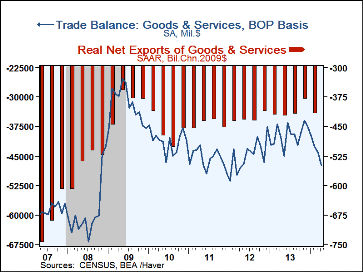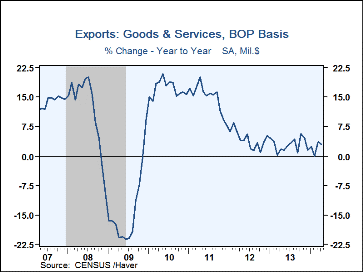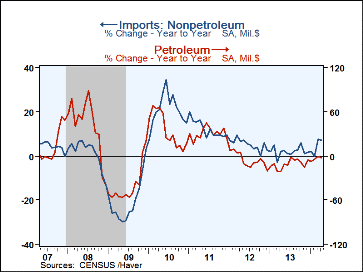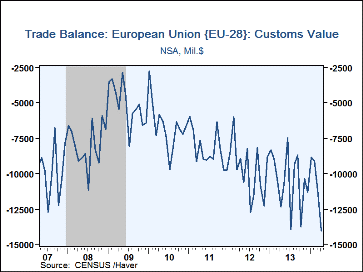 Global| Jun 04 2014
Global| Jun 04 2014U.S. Trade Deficit Deepens; Shortfalls With China and Europe Widen Sharply
by:Tom Moeller
|in:Economy in Brief
Summary
The U.S. foreign trade deficit during April surpassed expectations and rose sharply to $47.2 billion from $44.2 billion in March, last month reported as $40.4 billion. Exports declined 0.2% (+3.0% y/y following a revised 2.9% gain. [...]
The U.S. foreign trade deficit during April surpassed expectations and rose sharply to $47.2 billion from $44.2 billion in March, last month reported as $40.4 billion. Exports declined 0.2% (+3.0% y/y following a revised 2.9% gain. Imports increased 1.2% (5.4% y/y) following a strengthened 3.1% rise. The latest trade shortfall was the largest since April 2012 and it surpassed expectations for a $40.1 billion deficit in the Action Economics Forecast Survey. Data were revised back to 2011.
The April trade deficit in goods with mainland China deepened sharply to $27.3 billion and reversed most of two months of improvement. Exports to China rose 0.9% y/y while imports surged 9.6% y/y. The trade deficit with the European Union deepened to a record $14.0 billion. U.S. exports gained 11.2% y/y but imports rose 12.2% y/y. With Japan, the trade deficit was little-changed at $6.0 billion. U.S. exports improved 5.2% y/y but imports declined 5.7% y/y.
In constant dollars, the trade deficit in goods grew to $53.8 billion, the deepest since June 2010. Inflation adjusted exports inched 0.4% higher (3.0% y/y). The constant dollar value of foods, feeds & beverages exports declined 3.7% (+10.1% y/y) while real auto exports were off 1.6% (-0.3% y/y). Inflation adjusted exports of nonauto consumer goods fell 0.7% (-0.7% y/y) while real exports of capital goods also were off 0.7% (+3.3% y/y). Real exports of industrial supplies & materials gained 3.6% (2.6% y/y). Services exports notched 0.2% higher (3.2% y/y). Travel exports recovered 0.2% (4.9% y/y) as more tourists visited the United States. Passenger fares jumped 2.1% (9.4% y/y).
The value of U.S. petroleum imports declined 2.2% (-2.5% y/y) and the quantity of petroleum product imports fell 0.4% (-0.4% y/y). The price of crude oil increased m/m to $95.48 per barrel, still down from the $109.69 high reached in April 2012. Elsewhere, there were signs of economic strengthening. In constant dollars, nonpetroleum imports increased 2.5% (7.6% y/y). Real imports of autos surged 3.3% (8.4% y/y) while nonauto consumer goods exports gained 2.3% (7.2% y/y). Inflation adjusted foods, feeds and beverages imports increased 2.7% (6.2% y/y) and real capital goods imports rose 1.6% (7.2% y/y). Services imports inched 0.2% higher (3.9% y/y). Travel imports slipped 0.2% (+4.6% y/y) and passenger fares slipped 0.1% (+9.6% y/y).
The international trade data can be found in Haver's USECON database. Detailed figures are available in the USINT database. The expectations figures are from the Action Economics Forecast Survey, which is carried in the AS1REPNA.
| Foreign Trade (Current Dollars) | Apr | Mar | Feb | Y/Y | 2013 | 2012 | 2011 |
|---|---|---|---|---|---|---|---|
| U.S. Trade Deficit | $47.2 bil. | $44.2 bil. | $42.6 bil. | $40.4 bil. (4/13) |
$476.4 bil. | $537.6 bil. | $548.6 bil. |
| Exports (%) | -0.2 | 2.9 | -2.1 | 3.0 | 2.9 | 4.2 | 14.8 |
| Imports | 1.2 | 3.1 | -0.6 | 5.4 | 0.1 | 2.9 | 13.9 |
| Petroleum | -2.2 | -0.6 | -1.1 | -2.5 | -11.0 | -5.5 | 30.7 |
| Nonpetroleum goods | 2.2 | 4.8 | -1.3 | 7.3 | 2.0 | 5.2 | 12.1 |
Tom Moeller
AuthorMore in Author Profile »Prior to joining Haver Analytics in 2000, Mr. Moeller worked as the Economist at Chancellor Capital Management from 1985 to 1999. There, he developed comprehensive economic forecasts and interpreted economic data for equity and fixed income portfolio managers. Also at Chancellor, Mr. Moeller worked as an equity analyst and was responsible for researching and rating companies in the economically sensitive automobile and housing industries for investment in Chancellor’s equity portfolio. Prior to joining Chancellor, Mr. Moeller was an Economist at Citibank from 1979 to 1984. He also analyzed pricing behavior in the metals industry for the Council on Wage and Price Stability in Washington, D.C. In 1999, Mr. Moeller received the award for most accurate forecast from the Forecasters' Club of New York. From 1990 to 1992 he was President of the New York Association for Business Economists. Mr. Moeller earned an M.B.A. in Finance from Fordham University, where he graduated in 1987. He holds a Bachelor of Arts in Economics from George Washington University.
More Economy in Brief
 Global| Feb 05 2026
Global| Feb 05 2026Charts of the Week: Balanced Policy, Resilient Data and AI Narratives
by:Andrew Cates










